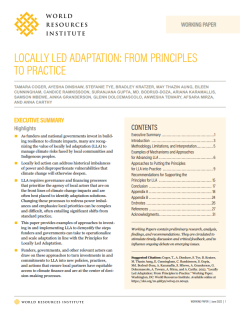
As funders and national governments invest in building resilience to climate impacts, many are recognizing the value of locally led adaptation to manage climate risks faced by local communities and Indigenous peoples.
Locally led action can address historical imbalances of power and disproportionate vulnerabilities that climate change will otherwise deepen. It also requires governance and financing processes that prioritize the agency of local actors that are on the front lines of climate change impacts and are often best placed to identify adaptation solutions. Changing these processes to redress power imbalances and emphasize local priorities can be complex and difficult, often entailing significant shifts from standard practice.
This paper provides a review of approaches to delivering locally led adaptation. Drawing on examples from Africa, the Asia-Pacific region, and the Caribbean and Latin America, it provides practical recommendations for financing and implementing locally led adaptation. It helps demystify the steps funders and governments can take to ensure local partners have equitable access to climate finance and are at the centre of decision-making processes.
